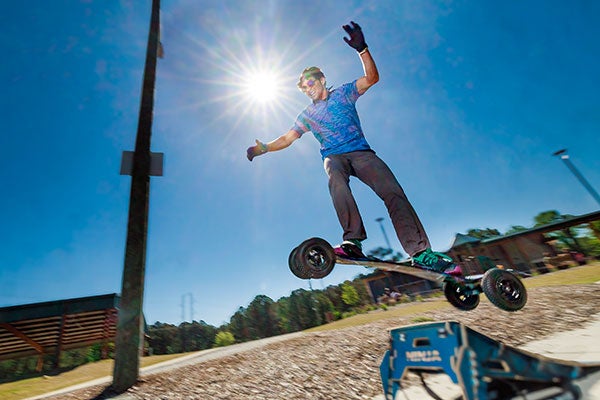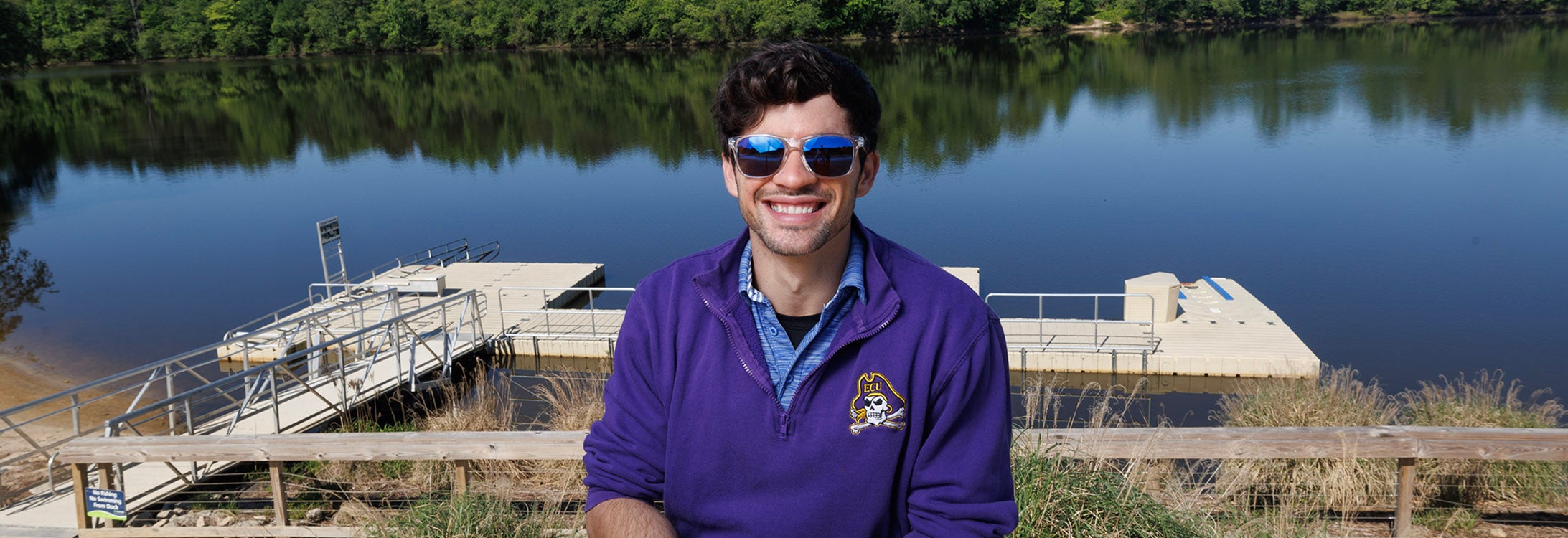John Sabin, Ph.D., Integrated Coastal Sciences
STATISTICS
Name: Johnnie Sabin
College: Integrated Coastal Programs
Major: Integrated Coastal Sciences
Age: 29
Classification/Year: Doctoral candidate (5th year)
Hometown: Atlanta, Georgia
Hobbies/interests: Hiking, scuba diving, boardsports (wake/snow/mountain), photogrammetry, DIY electronics
ECU GOES WITH YOU
How will you take ECU with you after graduation?
I have learned to excel at teaching myself skills beyond those received in a formal classroom setting, so there is more of an ‘applied confidence’ for troubleshooting technical issues.
East Carolina University graduate student John “Johnnie” Sabin has worked five years to design and conduct research for his dissertation project focused on ecosystem restoration in the Florida Everglades.
This summer, he’ll be the first to earn his doctoral degree in ECU’s integrated coastal sciences Ph.D. program.
After earning undergraduate and master’s degrees in anthropology, he wanted to expand beyond the discipline and get more theory. His graduate adviser at Florida State suggested he check out ECU’s new multidisciplinary doctoral program in the Department of Coastal Studies.
Sabin navigated several challenges, including the COVID-19 pandemic, since starting in 2019. But he persevered and followed his dream of designing his own dissertation project despite not having an adviser or mentor at ECU who conducts research in the Everglades, a subtropical wetland ecosystem that spans two million acres across central and south Florida.
Sabin’s background as a social scientist and environmental anthropologist informed his creation of a monitoring framework for tracking restoration efforts. He conducted in-person and virtual interviews with dozens of Florida stakeholders — including industry, recreation, science and landowners including Gladesmen and Indigenous community members. “I built the project from the ground up, I reached out to people, I built rapport with people,” said Sabin, who has served as a graduate research assistant at ECU.
He became drone-certified to take high-resolution images to see changes in conservation buffers. His satellite imagery, geospatial analysis and 3D modeling are helping determine if restoration efforts are making an impact in these buffer areas.
“I’m using that to give bones to the ideas being expressed and asking what’s going on, how are wilderness areas changing, what are the sorts of water futures we want to see in south Florida — those were a lot of the questions,” he said. “I was looking at what undermines conservation efforts and how that plays out.”
The conservation buffers sit between urban, residential and environmentally protected areas, and help sustain habitat, connectivity, water storage and flood mitigation.
Sabin grew up in Atlanta and often made trips to Florida. He became intrigued with its geography, fauna and miles of canals. He loved history and the classics, fascinated by National Geographic and History Channel documentaries, and became interested in anthropology after a high school presentation.
To aid in course and field work and make extra money, Sabin developed skills and took gigs on the side throughout his time as a student.
A competitive diver in high school and as an undergraduate at Georgia State, he became scuba certified. He pursued an underwater archaeology specialty in his master’s program, investigating submerged landscapes with an interest in Native American sites and coastal areas that have been inundated by sea level rise, which brings a long-term perspective to his work, he said.
In addition to his drone certification, he became licensed to trailer and transport boats while at ECU. He scraped boats, was a dredge permitting specialist for a marine contractor, and completed other project work from creating maps and synthesizing data sets to generating data visualizations and computational modeling.

Johnnie Sabin takes a break from research while riding his mountainboard at Wildwood Park.
“I have learned to excel at teaching myself skills beyond those received in a formal classroom setting, so there is more of an ‘applied confidence’ for troubleshooting technical issues,” Sabin said.
While at ECU, he has been a member of Pirates on Water, the student branch of the ECU Water Resources Center, and helped revive an annual Tar River cleanup and worked on other community projects.
He also met his girlfriend, ECU master’s student Alexandra Stevenson, in his adviser’s lab at ECU. Sabin is planning to help on her coral reef research project in the Virgin Islands later this summer. “A lot of my work with drones and photogrammetry can be applied underwater to getting the coral structure,” he said.
For the next few months, he will be working as a conservation and cultural research fellow with EMIGRA, providing feedback on resource management and great hammerhead sharks in the Atlantic Southeast.
Sabin said he has had made lifelong friends and had great support at ECU from faculty members, his adviser Cynthia Grace-McCaskey and everyone in his integrated coastal sciences cohort, a small group who became closer in the tragic death of a loved classmate in spring 2021.
With graduation approaching, Sabin wishes he had more time to work on his project. “I’m really just getting started here. There’s a wonderful world that I’ve opened up with at least how to approach this holistic ecosystem restoration that I’ve deemed it broadly,” he said.
He wants the research to help people. “I have this interactive platform that extends from my research, so it’s not just a dissertation that goes on a bookshelf. That kind of gives people a way to monitor. It works like ArcGIS StoryMaps, and it’s a cool interactive thing that people can crowdsource information, they can download their own sort of data about these restoration areas,” he said.
In the interim, he has been polishing and rewriting parts of his dissertation, preparing for publication, and applying for jobs with a goal of working with people under and over the water — hoping to make an impact wherever he goes.
FALL 2024 GRADUATE PROFILES
